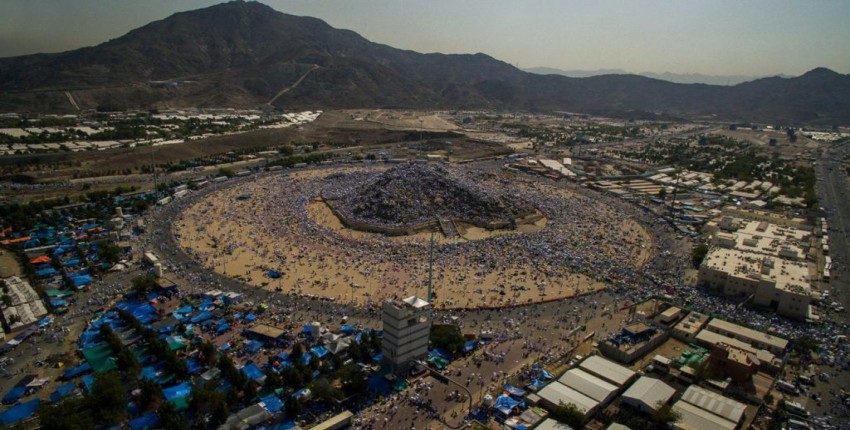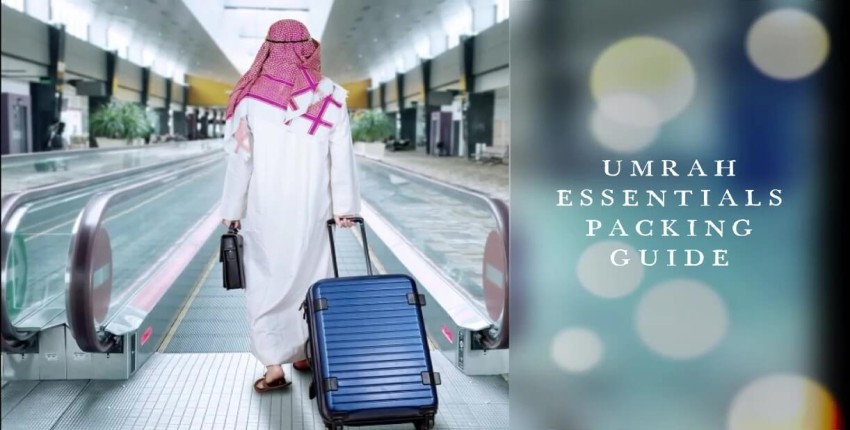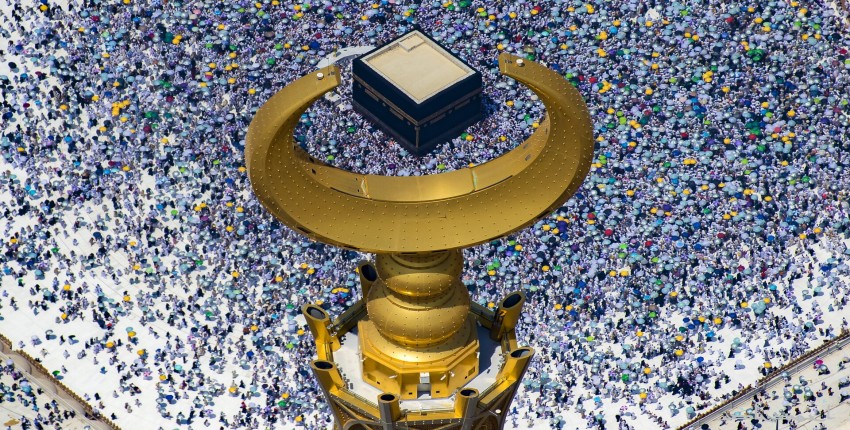Jabal E Rahmat
It is also known as the “Mount of Mercy” or “Jabal Arafat”. Visiting this site is amongst one of the rites and main pillars of Hajj. This mount is located 20 kilometers east of Mecca. Pilgrims stand there on the 9th of Zil Hajj as standing there is the most significant element of Hajj as it was directed by our Prophet Hazrat Muhammad (S.A.W). Arafat is situated beyond the boundaries of Haram (Sanctuary site), with a maximum size of 10.4 km2. Irnah Valley is located on Arafat western outskirts. The Nimrah Mosque, at which Arafah prayer and sermon are delivered, is one of its primary monuments. Arafah is considered to be the day when God's kindness descends and Muslims get redeemed. It is among the fortunate days of the sacred months, as well as the day on which God successfully completed Islam and bestowed His blessing on humanity. Fasting on Arafah is encouraged because it is said to atone for sins committed in the previous and current year.
Jabal Al-Rahma is also known as Jabal Al-Dua, or the Mount of Prayers, in Arabic. Though standing on the peak of the ridge is not one of the Haj obligations, numerous pilgrims think it is one of the Arafat rituals. It is a misunderstanding since standing in Arafat entails spending quality time praying and pleading anywhere inside Arafat's borders. The most significant component of Haj is standing at Arafat, termed in Arabic as Wuquf-e-Arafat.
The Actual Meaning and History of Arafah
The term “Arafat” means “to know,” and this is where Adam (A.S) and Hawa (A.S) first interacted on earth after getting expelled from Jannah. On Jabal-e-Rahma, the Prophet Muhammad (S.A.W) delivered his Farewell Sermon to the other Muslims who had joined him on the Hajj journey in his later years. For Muslims, the Day of Arafah is a highly important and pious day. Verse 5:3 of the Qur'an was disclosed to Prophet Muhammad (S.A.W) when he was standing on the field of Arafah. This day is also identified as ‘Freedom from Fire.' The Prophet Muhammad (S.A.W) is reported to have emphasized the relevance of standing on Arafah as an integral element of completing Hajj. In a Hadith it is mentioned that 'A'isha (Allah be pleased with her) reported:
What Do Pilgrims Do On Jabal-E-Rahmah On the Day of Arafat?
If you are performing Hajj, the second day of rites will be focused on Mount Arafah. At dawn, approximately millions of Muslims will travel from Mecca to the hills of Mount Arafah. Pilgrims will stand in true adoration from dawn to dusk, offering their hearts and soul to Allah (SWT) and begging for His compassion. To obtain Allah's pardon, this supplication should be entirely coherent. Numerous pilgrims will cry as they say prayers and make passionate Duas. Every pilgrim will be in a condition of Ihram (cleanliness), and their immaculate white attire equalizes their standing before Allah.
Pilgrims perform the Arafah prayer from Zuhr prayer to sunset, and those who cannot travel to Mecca do it at mosques. People who are not participating in the hajj are recommended to fast on this day since it is thought that they will gain enormous advantages and their misdeeds will be pardoned.
Value and Significance of Jabal-E-Rahmah for Hajj Pilgrims
For Hajj pilgrims the mountain of Arafat holds great importance because they are aware that their Hajj would be incomplete without it. Those who forget to complete this ritual means they have missed the Hajj. They will have to perform Hajj again successfully. In a Hadith 'Abdur-Rahman bin Ya'mar reported that:
The day of Arafat is special for the Muslim community as it offers numerous benefits, as described in several Ahadith. In one more Hadith, it is stated that:
Fasting On the Day of Arafat
Fasting on this valuable day of Arafat is of immense relevance as it’s a source of the atonement of your hitherto committed sins. It was informed by Abu Qatadah that a man said:
Fasting on the Day of Arafat is not Sunnah for people performing Hajj, because the Prophet Hazrat Muhammad (S.A.W) did not fast on this day when at Arafat. Fasting is mustahabb (recommended) on this day for those who are not doing Hajj.
Dua to Recite On This Day at Jabal-E-Rahmah
Pilgrims can recite any Dua they like while praying at Arafah but the below-mentioned Dua is one of the Dua’s that our Prophet Hazarat Muhammad (S.A.W) has recited.
What You Should Do If You Are Not at Jabal-E-Rahmah On Arafat’s Day?
Don't be concerned if you are unable to perform the religious Hajj pilgrimage. There are several more methods of obtaining Allah's (SWT) mercy without attending Jabal Rahmah. It is strongly advised to follow the following steps to participate on this day:
- Fast from sunrise to sunset.
- Donate freely to charity and help others as much as you can.
- Recite the Qur'an and ponder its translation.
- Recite Dua’s as often as you can and repent for your sins from the previous year and the coming year.
- Glorify Allah in all your deeds, therefore avoid bad behavior and cruel acts.
In A Nutshell
After this day, Muslims celebrate Eid-ul-Adha and marks the end of their Hajj pilgrimage. It is an extremely exceptional peak with substantial worth in Islam. On this mountain, Muslims pray and recite Duas in order to get limitless blessings from Allah Almighty. The advantage of this location is that it enables you to request or demand anything from Allah (SWT) and receiving a response is guaranteed. Our Prophet Hazrat Muhammad (S.A.W) and Prophet Ibrahim (A.S) both performed Du'a in this precise location. Jabal-e-Rahmah is the mount of Rehmat where Allah Almighty forgives and showers His benedictions on the pilgrims.




